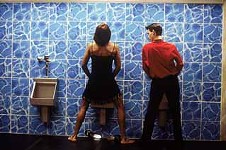Rosie
1998, NR, 97 min. Directed by Patrice Toye. Starring Dirk Roofthooft, Frank Vercruyssen, Sara De Roos, Aranka Coppens.
REVIEWED By Russell Smith, Fri., Oct. 29, 1999
Of all the troubling ideas suggested by Belgian director Toye's debut feature, here's the one that really hits you like a cold chisel between the eyes: Much of the world's misery is attributable to the very same dreams that sustain people through their sadness. Heartbreak Central in this powerful but deeply pessimistic film is Rosie (Coppens), a 13-year-old girl living in a crowded suburban flat with her lonely, lost-souled young mother, Irene, and her deadbeat uncle, Michel. Irene (de Roos), good intentions notwithstanding, is more sibling than parent to Rosie, even insisting that she be called “sister” rather than “mommy.” (The Chinatown-style clarification of this issue is broadly foreshadowed and sets up a couple of late plot twists.) Displaced from her room by Michel's arrival and from maternal attention by Irene's parade of boyfriends du jour, Rosie slips into a personal fantasyland constructed from equal parts of pop love ditties and softcore porn novels. The irony here is that, for all the story's allusions to romantic fantasy, much of its heartbreaking impact comes from its grim, documentary-like naturalism. Toye's painfully recognizable characters are trying to shoehorn the wretched particulars of their actual lives into comforting archetypes of loving domesticity. Sadder than the self-deception itself is its implied role in spawning doomed teen romances, broken families, and the whole familiar Springerian panoply of modern cultural dysfunction. But even in the middle of all this grim determinism is a handful of scenes in which fleeting self-awareness and the unexpected kiss of sheer dumb luck offer at least a glimmer of hope. There's a startling naturalness to much of the acting. Coppens' performance is especially brilliant in portraying the adolescent spirit's odd mixture of recklessness and seething repression. De Roos is equally affecting as Irene, an underwritten character who nevertheless adds reams of subtext to the story with wordless response takes. Like Judy Davis, de Roos is able to register sadness as a prismatic array rather than a single emotional color. None of these virtues offer much relief from the stark, unsettling impact of Toye's vision. Still, her refusal to let us off the hook with teary group hugs and glib epiphanies is honest artistic behavior that should be treasured in our era of market-tested-unto-death mainstream cinema.
A note to readers: Bold and uncensored, The Austin Chronicle has been Austin’s independent news source for over 40 years, expressing the community’s political and environmental concerns and supporting its active cultural scene. Now more than ever, we need your support to continue supplying Austin with independent, free press. If real news is important to you, please consider making a donation of $5, $10 or whatever you can afford, to help keep our journalism on stands.
Rosie, Patrice Toye, Dirk Roofthooft, Frank Vercruyssen, Sara De Roos, Aranka Coppens







